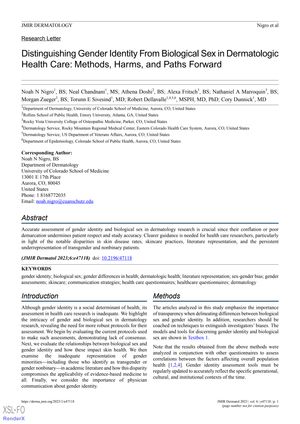Distinguishing Gender Identity From Biological Sex in Dermatologic Health Care: Methods, Harms, and Paths Forward
March 2023

TLDR Accurate gender and sex assessment in dermatology is essential for respectful and precise patient care.
Accurate assessment of gender identity and biological sex in dermatology research is crucial as conflating or poorly distinguishing them undermines patient respect and study accuracy. Clearer guidance is needed for health care researchers, especially given the notable disparities in skin disease rates, skincare practices, literature representation, and the persistent underrepresentation of transgender and nonbinary patients.



